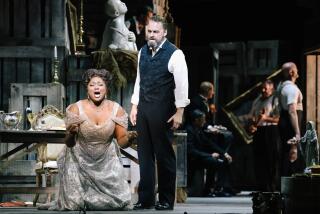The Many Women of Ingrid Caven
- Share via
In Europe, Ingrid Caven is considered the most stylish chanteuse to have graced the cabaret stage since Edith Piaf and Marlene Dietrich. With her fiery red hair, painted face and crow black mascara, the sultry German singer recaptures the aura of sophisticated seediness that flavored the prewar German cabaret scene.
But as Caven made her entrance at the Ballroom in Manhattan during her American debut, which ends Sunday, it was the comic in her that was at work. While Tchaikovsky was being played by the singer’s backup quartet, Caven tripped in her tightly fitted Yves St. Laurent black satin gown and sent a music stand crashing onto the stage. Just as the fallen diva seemed on the verge of utter humiliation, she tossed back her hair, picked up the microphone and launched into a collection of songs that ranged from the raunchy to the sublime. A couple of songs passed before the audience began to realize the fall was a stage device.
A master of a thousand voices and moods, Caven says she likes to role play during her performances. Her body, she says, is like a medium, visited by the countless women that make up her stage persona.
“I am a mask,” she says. “I am transparent. I like to let these different women pass through me when I’m on stage.”
Virtually unknown in the United States, Caven first gained attention as an actress in the films of the late German director Rainer Werner Fassbinder, whom she married for a brief period in the early 1970s. Three of the songs that Caven performs were penned for her by Fassbinder.
Caven also delivers an erotic rendition of “Ave Maria” and sings a duet with the voice of Elvis Presley hanging in the theater like a stage ghost. The classically trained singer demonstrates how remarkable an instrument her voice is with such classics as Piaf’s “La Vie en Rose” and Franz Shubert’s “Serenade,” a song she first sang as a little girl with her father.
“I first begin singing as a child,” she says in uncertain English, “and I felt always pleasure. If I can’t have that physical sensation when I’m on stage, I don’t want to sing.”
Does she still feel like a child when she performs? “Oh, no,” she insists. “I am no more a child, not at all.”
More to Read
The biggest entertainment stories
Get our big stories about Hollywood, film, television, music, arts, culture and more right in your inbox as soon as they publish.
You may occasionally receive promotional content from the Los Angeles Times.










